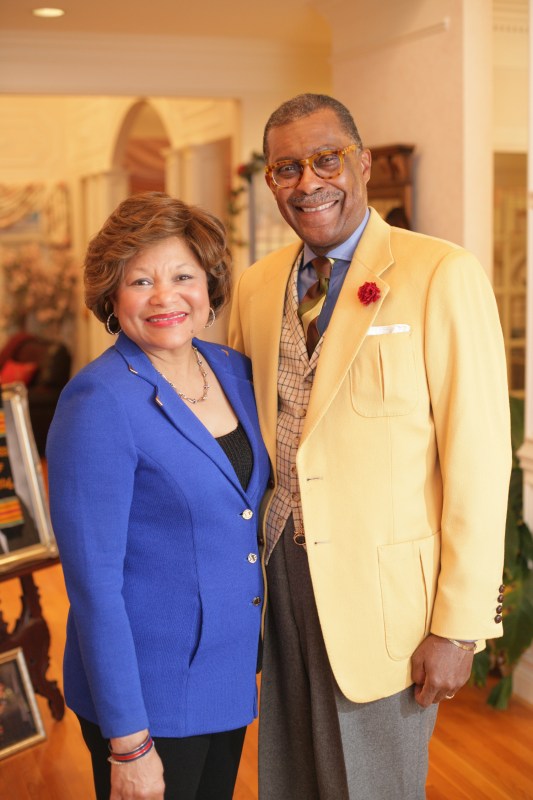
Andre Churchwell, M.D., here with his wife, Doretha, has been named associate dean for Diversity for Vanderbilt University School of Medicine. (photo by Daniel Dubois)
Churchwell named to oversee VUSM diversity efforts
Andre’ Churchwell, M.D., associate professor of Medicine (Cardiology), Radiology and Biomedical Engineering, has been named associate dean for Diversity for Vanderbilt University School of Medicine, a new leadership position that combines two previously separate offices.
Churchwell has served as associate dean for Diversity in Graduate Medical Education (GME) and Faculty Affairs since 2007. Now he will combine that role with leadership of Diversity in Medical Education, the office formerly led by George C. Hill, Ph.D., who in August was named assistant vice chancellor for Multicultural Affairs and special assistant to the provost and vice chancellor for Health Affairs.
“My role is to make sure Vanderbilt represents to the outside world what diversity is all about,” Churchwell said. “Because we are living in an era where borders are smaller and the world is many colors, we cannot afford not to include the best and brightest people who have been underrepresented in the past.”
Jeff Balser, M.D., Ph.D., vice chancellor for Health Affairs and dean of VUSM, said Churchwell is the perfect choice for this position.
“Andre’s nature is to connect with people and to connect them to one another, and that fits well with Vanderbilt’s goal to bring the diversity of the world here and to nurture a diversity of ideas and inspiration.
“The strength of our leadership training, offered to people of diverse backgrounds and life experiences, will allow Vanderbilt to contribute in ways we can’t even imagine,” Balser said.
Churchwell credits Hill and VUSM leadership — including Bonnie Miller, M.D., senior associate dean for Health Sciences Education, John Zic, M.D., associate dean for Admissions, and Scott Rodgers, M.D., associate dean for Students, among others — for tremendous progress in recent years. In 2002, there were only five underrepresented minority students at VUSM. In the last four years, there have been between 15 and 24 underrepresented minority students in each class.
The area of diversity is constantly changing, and competition has become fierce to attract the best and brightest students and staff who are underrepresented in medicine.
Until 2004, the Association of American Medical Colleges (AAMC) defined underrepresented minorities in medicine as African-Americans, Mexican Americans, mainland Puerto Ricans and Native Americans (American Indians, Alaskan natives and native Hawaiians). Today the AAMC states that underrepresented in medicine means those racial and ethnic populations that are underrepresented in the medical profession relative to their numbers in the general population.
The Office of Diversity supports the AAMC definition and offers support to medical student groups as diverse as international students and gay, lesbian, bisexual, transgender (GLBT) students, among others.
Second Look weekends — where prospective medical students tour the school — in early 2012 are considered critical opportunities to attract diversity in new medical students and residents and fellows.
With the full backing of the University, the Office for Diversity is moving ahead at full steam. Churchwell said the office will be very visible in the coming years — especially to its target audience. Recognition has already begun, as evidenced by Vanderbilt being praised as a champion of diversity during the AAMC’s recent president’s address.
“Since day one, the Office for Diversity at Vanderbilt has had a major commitment of senior leadership support from the Chancellor to the Vice Chancellor and administration. You cannot advance diversity at a medical school without clear, undiminished, continued support from the highest levels of senior leadership. We want Vanderbilt to be the most diverse medical center we can be. It will take a few years, but we’ll get there,” Churchwell said.
A 1975 magna cum laude graduate of Vanderbilt University with a degree in Biomedical Engineering, Churchwell graduated from Harvard Medical School and completed his internship, residency and cardiology fellowship in Atlanta at Emory University. In 1984, he became the first African-American chief resident of Medicine at Grady Memorial Hospital.
After completing his training, he joined the faculty at Emory, where he served as the first director of Diversity for the medical school from 1985 to 1991, receiving the Robert Wood Johnson Foundation Minority Faculty Development Award in 1986.
In addition to maintaining his clinical duties, Churchwell keeps busy on numerous boards and committees both on the Vanderbilt campus and across the nation. He says diversity is a passion because he knows where Nashville and Vanderbilt have been and has seen how much progress has been made, but he also says he knows how much further there is to go.
Churchwell said he depends on his wife, Doretha, a nurse-educator at Vanderbilt, to advise him on navigating the administrative challenges of running an office, but also to help him stay grounded.
“My parents taught me that if you are going to do something, do it well. I credit my father for providing the example of dedication I follow today, but you need balance in your life, and you need to have a family,” Churchwell said.













